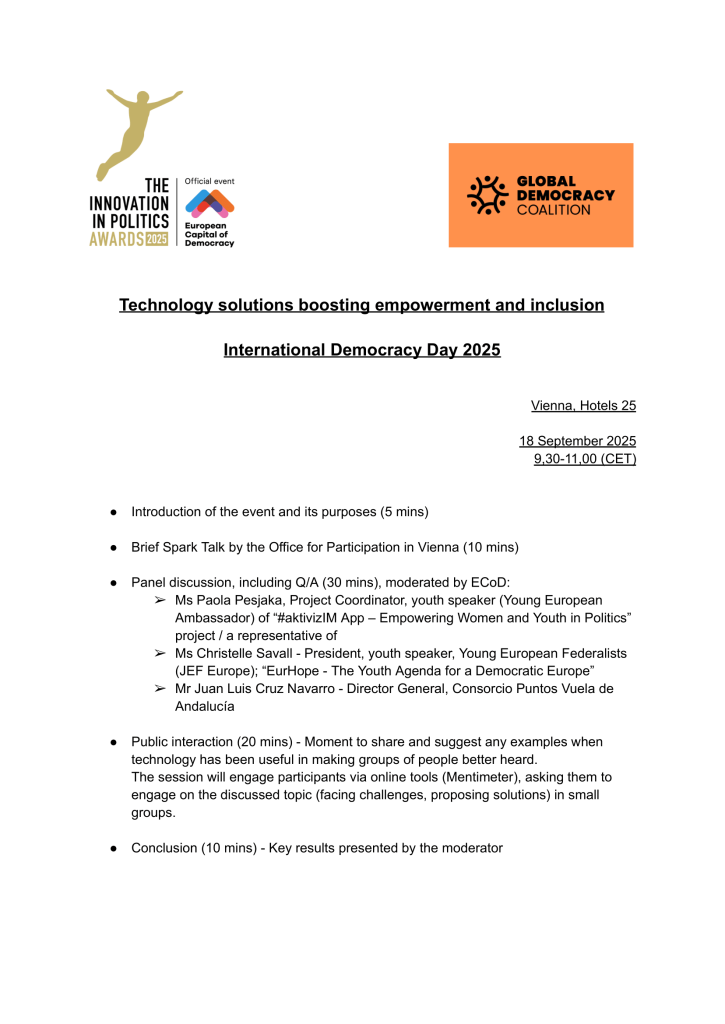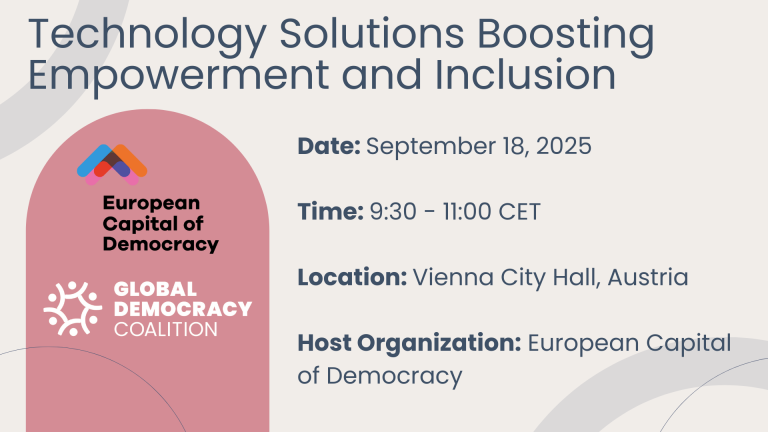Date: September 18, 2025
Time: 9:30 – 11:00 CET
Location: Vienna, Austria
Host Organization: European Capital of Democracy
Virtual Participation Link: https://www.youtube.com/live/RNlBW-o8tJo
The Innovation in Politics Awards is an annual event that recognises courageous and creative political projects. Its aim is to create a growing network of the best minds in politics with a view to sharing knowledge and promoting the exchange of best practice at all political levels and across borders and party lines. This hybrid session will be organised on the day after the Innovation in Politics Awards 2025, 18 September.
Two to three finalist projects of the Innovations in Politics Awards 2025 present the use of technology and online tools as a way to better empower categories that often risk to be left behind. Such examples provide a great opportunity to discuss the role of technology in our society, and how its potential could be better exploited, overcoming the mistrust technology is facing by an ever growing part of the population.
The “#aktivizIM App – Empowering Women and Youth in Politics” finalist case tackles youth empowerment and focuses on active participation of women and youth. It is aimed at boosting youth activism and political participation of women and girls in Albania. Despite their critical role in shaping the future, these groups face persistent barriers and remain underrepresented in political processes. The app provides an inclusive, innovative platform designed specifically to empower young people, especially girls and women, to actively engage in their communities.
“EurHope – The Youth Agenda for a Democratic Europe” is another finalist project which focuses on youth participation. It responded to the growing disconnection between young Europeans and EU politics by launching the first EU-wide, multilingual consultation focused on youth. Over 1.5 million votes and 5,000 proposals were collected to form the Agenda of Hope—a set of 15 priorities representing young people’s vision for the future of Europe. At a time when youth are often excluded from meaningful participation, the project positioned their voices at the heart of the
European democratic process.
“Puntos Vuela: Bridging the Digital Divide in Andalusia’s Rural Communities” created a network that bridges the digital divide in rural areas of Andalusia, empowering communities with free digital skills training and access to technology for social and economic development. Puntos Vuela offers free training in basic and advanced digital skills, facilitates access to online public services, and fosters social inclusion for historically marginalised groups. For instance, the network actively supports entrepreneurship and innovation by integrating cutting-edge technologies in the agricultural sector.
A representative of the Office for Participation from the City of Vienna will introduce the session, highlighting the international relevance of this topic, and sharing how Vienna is working on the use of technology for citizens’ engagement during their Democracy Year as European Capital of Democracy.
Participants will be invited to engage with the topic through online tools (e.g. Mentimeter).
Event Programme:

Key Takeaways
1. Technology as an Enabler for Democracy
- Technology, including AI, can be harnessed to empower citizens, foster inclusion, and strengthen democratic processes.
- There is a conscious effort to shift the narrative from technology as a threat (disinformation, exclusion) to technology as an opportunity for positive change.
2. Inclusive Participation
- The Vienna model actively removes barriers to participation, ensuring that all residents—including non-citizens—can contribute to shaping their city.
- Special attention is given to reaching groups not traditionally engaged in participatory processes, including older adults and linguistic minorities.
3. Transparency and Feedback
- Maintaining transparency and providing regular feedback to participants is crucial for trust and sustained engagement.
- Digital platforms are used not just for idea submission, but for ongoing communication about project status and outcomes.
4. Hybrid Approaches: Digital and Analogue
- While digital tools are central, face-to-face engagement and analogue methods remain vital, especially for reaching those less comfortable with technology.
5. Linguistic and Cultural Diversity
- Multilingual platforms and outreach are essential in diverse urban contexts.
- Efforts are underway to expand language offerings and make participation accessible to all.
6. Youth Engagement and Diversity of Views
- Young people are engaged and have diverse, sometimes conflicting, views on democracy and policy.
- Campaigns like “Your Hope” demonstrate the value of directly asking youth for their ideas and priorities, rather than making assumptions.
7. Digital Inclusion in Rural and Urban Areas
- Projects like the ELA network in Andalusia show how digital hubs can bridge divides, offering training, access, and empowerment in underserved areas.
8. Challenges: Accessibility, Resources, and Awareness
- Key challenges include making platforms accessible (simple sign-up, multiple languages), ensuring sufficient personnel for feedback, and raising awareness about available tools.
- There is ongoing work to address digital divides, biases in technology, and the risk of exclusion.
9. Sustainability and Scalability
- Maintaining and scaling digital participation tools requires ongoing funding, technical support, and adaptability to new technologies (e.g., AI, multilingual support).
10. The Importance of Local and Cross-Border Networks
- Local initiatives are powerful drivers of innovation, but cross-border networks (like the European City Network) amplify impact and foster shared learning.
Impactful Quotes
- “Democracy must be cultivated, defended and further developed.”
- “We are absolutely sure that we can use technology and AI and new inventions for the good of society, and that we can make them work for democracy.”
- “Our goal is to enable more Viennese residents to really get involved in actively shaping the city they live in.”
- “We see ourselves as promoters of participation… really trying to remove barriers to make participation possible.”
- “Every step of this project, every step of the way is involving the Viennese citizens and everyone can participate. You don’t have to have an Austrian passport, which is also important.”
- “It’s a little bit of a misbelief that no older people use digital devices and digital offers. Yes, they all have grandkids as well.”
- “There has to be more languages offered than German… Many different people who speak other languages live in Vienna and we have to embrace this.”
- “It’s also a question of transparency when you start this use. You have to stay in contact with the people and also inform them about the ongoing status of their ideas.”
- “Technology is inclusive and human-centred, it empowers people and strengthens communities.”
- “Young people are not apolitical, as it is often claimed, and they might not be as united on certain topics as we would like to believe.”


